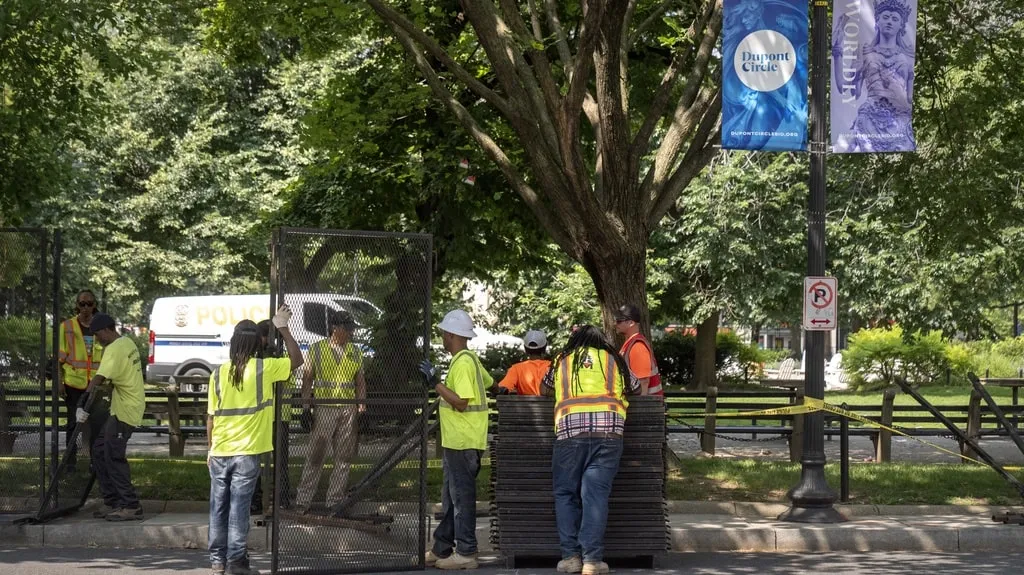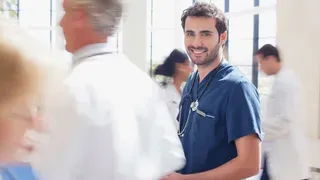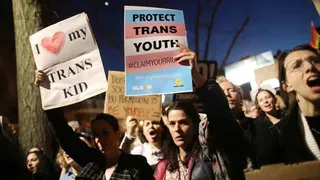Gay Catholics :: balancing belief and doctrine
The Roman Catholic Church just observed the most sacred dates on its liturgical calendar. Good Friday and Easter Sunday mark the death and resurrection of Jesus Christ.
But as Holy Week approached, the Church was rocked by allegations that its hierarchy took little action against priests in at least four countries (the United States, Ireland, Italy and Germany) accused of molesting boys under their spiritual care.
The allegations reached all the way to Pope Benedict XVI, who 30 years ago as Cardinal Joseph Ratzinger, archbishop of Munich, reportedly reassigned a priest accused of pedophilia instead of dismissing him or notifying law enforcement.
William Donohue, he current president of the Catholic League for Religious and Civil Rights, defended the pope against the firestorm of criticism contended 80 percent of the priests who committed the abuse are gay, despite experts saying the vast majority of pedophiles are straight.
Latest anti-gay volley
This marks the latest anti-gay volley by the Church, which has been at the forefront of those opposing same-sex marriage. Most recently they help fund the successful campaigns to turn back marriage equality in California and Maine.
The Church has been incendiary in its opposition to gay marriage. For instance in October 2004, at the Eucharistic Congress held in Mexico, it was declared that the Catholic Church would never accept homosexuality as something "normal."
"It is unacceptable to maintain that anything living under the same roof - including cockroaches, cats and dogs - can be called a family, which is what those who defend homosexual marriage want," wrote Bishop Javier Lozano, president of the Vatican's Pontifical Council for Health.
When Washington, D.C., legalized marriage equality (the first licenses were issued March 3), Catholic Charities there stopped offering new employees spousal benefits so it could avoid having to give them to same-sex partners.
The question is why?
Yet thousands of gay and lesbian Roman Catholics in the U.S. and around the world continue to practice their faith.
The question is why?
EDGE spoke with Chuck Colbert, a journalist who has written for the National Catholic Reporter, for a reason.
"For Catholics, their identity as a Catholic is important," he explained. "The sacraments and the Catholic community are very important. For cradle Catholics-those who were baptized as infants and grew up in the Church--it is very difficult to walk away because it is such an important part of their lives. Some people also have a strong sense of social justice and that's what keeps them in."
The common thread among gay Catholics to whom we spoke is that they ignore the hierarchy (bishops, archbishops, cardinals and the pope), which they believe is not following the teachings of Christ.
Many attend weekly Mass in liberal Catholic churches that welcome gays and lesbians despite the hierarchy's attitude. Others worship at non-Catholic churches where Catholic priests say Mass under the sponsorship of
Founded in 1969, Dignity had a tenuous relationship with the Church until 1986, when Ratzinger, then in charge of enforcing doctrine at the Vatican, ordered bishops to expel it from Catholic churches because he believed Dignity dissented from its teachings.
At that time Ratzinger issued a letter to the Catholic Bishops in which he wrote that gay "inclinations" indicate an "intrinsic moral evil" and must be seen "as an objective disorder." In 1992 he came against human rights for gays and lesbians saying that their civil liberties could be "legitimately limited." He later said that "neither the church nor society should be surprised" if "irrational and violent reactions increase" when gays demand civil rights. In recent years he has also been instrumental in ferreting out gay clergy.
"There" s="" no="" denying="" that="" the="" atmosphere="" from="" the="" official="" church="" has="" become="" more="" and="" more="" toxic="" to="" gay="" people="" in="" recent="" years,"="" Dignity="" USA's="" Executive="" Director="" Marianne="" Duddy-Burke="" told="" EDGE.="" "But="" for="" me="" the="" basics="" come="" down="" to="" what="" model="" of="" church="" you="" believe="" in.="" I="" think="" most="" people="" really="" confuse="" the="" hierarchy="" with="" the="" Church.="" I="" experience="" church="" as="" the="" people="" trying="" to="" live="" out="" the="" messages="" of="" Jesus="" Christ."
It's the commonality with other Catholics that keeps Duddy-Burke rooted in the Church. There's another reason' target='_blank'> "I believe it's mandatory that there be authentic Catholic voices that can point to the errors in what our church leaders are saying and doing, and help Catholics who feel discomfort at the higher ranks of leadership to articulate their own beliefs."
Catholics have a long history of privately dissenting from Church teachings. The term "cafeteria Catholic" describes those who pick and choose which doctrines they adhere to.
For example, straights may practice birth control or continue to be faithful even though they are divorced and have remarried.
"A difference for gay people is that this is about who we are," Duddy-Burke explained. "We're attacked at our very core. The Catholic bishops don't say that people who get divorced and remarry are intrinsically evil. Our challenge has been to be a little -- or much more public -- in our dissent."
Cradle Catholics
All of the gays and lesbians with whom EDGE spoke are cradle Catholics and continue to practice their faith despite the hierarchy's positions.
"The government of the Church does not have a corner on the truth," said Lourdes Rodriguez-Nogues of Boston. She believes one of the problems with the hierarchy "is that it is an all-male group."
She called the absence of women priests "one of the great sins of the Church. They are really shutting down half the population."
Vice president of DignityUSA's board of directors, Rodriguez-Nogues has been active in the organization since 1978. She told EDGE that if it were not for Dignity, she probably wouldn't still be a Catholic:
"It's a place where all of me is recognized -- my womanhood, my Latino-ness and my gayness."
Born in Cuba, Rodriguez-Nogues is 62 and a psychologist. She and her family fled that country in 1961, two years after Fidel Castro came to power. They settled in Puerto Rico and moved to Boston in 1977.
She said there are two reasons why she stays in the Church. "First, I'm holy stubborn -- both wholly and holy."
Even as an adolescent, Rodriguez-Nogues questioned Church authority. Her mother called her a "pick-and-choose" Catholic who used to ask why women couldn't be priests or tell her that something a priest said "just doesn't make any sense to me."
The other reason is her Latino ethnicity: "If we were raised Catholic, we call ourselves Catholic."
When she came out as a lesbian, it never occurred to Rodriguez-Nogues that it was an issue with God. "Some people struggle with that," she said. "That was not my struggle. The 'woman thing' was much more of an issue for me."
She worried about what people were going to think about her sexual orientation and whether it would cause her problems at work, but never thought that God would not love her.
Rodriguez-Nogues understands when people tell her they don't have to go to church to pray. "I totally agree with that perspective, but practicing my faith in a community was important to me. I wanted to be in a group of people for the discussion, the education, the social action. That has always appealed to me. The idea of being an active member of the Body of Christ is part of how I see expression of my Catholic faith."
Victor Postemski is president of Dignity's Boston chapter. He's 30 and grew up in Connecticut, where he graduated from Sacred Heart University in Fairfield. He moved to Boston eight years ago to attend grad school at Northeastern University and now works in higher education.
Emphasizing that he was not speaking for Dignity, Postemski said he remains in the Church because he grew up in it.
"It's not so easy to leave an institution, even with all the damaging things the Church says about gays," he explained and added that he separates being Catholic from the institutional church. "I look at it as an organization run by imperfect beings who sin just like I do. God made me gay and made me Catholic."
Postemski cited social action as a key reason why he remains faithful. "That's one of the strengths the Church has," he said. "We forget all of the good it does for people. Almost every kind of social justice organization that's fed the hungry or taken care of the homeless is somehow connected to a religious organization. I think the sad thing is that we forget that."
Asked if he is criticized by his gay friends for remaining a Catholic, he replied, "Absolutely. All the time. My other friends who are not at church with me probably have given up on religion."
While he doesn't know anyone who left the Church after the defeat of marriage equality in Maine last November, he does know some who left because of the pedophile scandal in Boston a few years ago. "They questioned the validity of going to church," he reported.
Criticism by people Postemski knows has increased since pedophile priests made headlines in March:
"They'll ask, 'What's going on the Catholic Church?' I remind them that it's a horrible thing and it's unfortunate that the leadership is not preventing it from happening. It's a minority of priests that are doing these things. Most are feeding the hungry and doing the other things we want them to do. It's unfortunate that the others are creating so much damage."
Support helps
A gay activist, Robert Brande is 23 and lives in Queens, N.Y. One of his biggest accomplishments, he told EDGE, was recruiting dozens of members of Dignity's New York City chapter to attend the National Equality March in Washington last October.
He said he considers himself fortunate because he has a supportive extended Catholic family, most of whom attend church regularly. "A lot of them have marched with me or called politicians" to advocate for gay rights.
He's also been blessed because priests, nuns and lay religious leaders with whom he's interacted are not anti-gay.
While he didn't come out until he was 19, "I remember always being involved in the Church, even at 14, knowing that equality for LGBT people was important. That was a value instilled in me by my religious community as well as my parents."
Brande recalled seeing The Laramie Project, the HBO movie adaptation of the off-Broadway hit about the aftermath of the 1998 murder of Matthew Shepard, with a youth group in the basement of his church.
"It's easy to remain gay and Catholic when you have that kind of support," he explained. "My parents said Jesus would not not accept you."
While he's comfortable right now being a Catholic, Brande worries about the future: "I need to see where the Church goes in the next couple of decades, because some day I want to have a family and children, and I don't want to belong to a church that says it's wrong."
He once asked a gay Catholic theologian, "At what point do we say enough is enough?" The reply: "When you believe that Jesus is no longer here at all."
"I will no longer be a Catholic in any way if I don't feel comfortable in a Catholic church," Brande said.
He also gets criticism from former Catholics. He related what happened when he staffed the Dignity booth at the GLBT Expo at the Jacob Javits Convention Center in March:
"Four people came up to us. They were older men, in their fifties or sixties. Most people younger than a certain age don't care, but there's an older generation who have a lot of anger toward the Church. They said to us, 'You are totally wrong'."
Lauren Carpenter is in her 20s and lives in Washington, D.C., where she works in a volunteer program coordinating activities for formerly homeless adults.
She grew up Catholic and her parents attend weekly Mass, but there was never any pressure to remain in the Church.
"I decided I really loved the Church from a young age and I had my own coming-out process in college," she said. "I went to Smith, a liberal institution. There was a really great group of Catholic women on campus who loved the Church and wanted to be a part of it."
She realizes that those in the hierarchy may not want her in the Church, "but they don't get to say whether I stay. I want to keep working from within. I speak Catholic lingo and want to be an ambassador to those who don't know lesbians."
Carpenter's girlfriend lives in Baltimore, so she spends every other weekend there. In Washington, she attends a Dignity-sponsored Mass, but in Baltimore the couple found "a really open and inclusive Catholic church."
Welcoming parishes
There are a surprising number of such welcoming churches. One is in Boston's Back Bay.
Another is in San Francisco's heavily gay Castro neighborhood, where Christian Irizarry is a communicant.
Irizarry is an HIV/AIDS housing specialist at , one of the largest HIV housing providers on the West Coast.
He grew up Catholic, but left the Church for a long time. "When I got into recovery I started to have a need for some sort of spiritual life and tried a bunch of different things," Irizarry told EDGE. "I wound up going back to the Church and was very lucky to find Most Holy Redeemer where 80 percent of the congregation is gay."
The sacraments, which "are very important to me," were a big attraction. He's a Eucharistic minister and a lector, someone who reads from the scriptures during Mass.
The parish has a strong outreach ministry. "We have an AIDS support group and I used to be a facilitator," Irizarry reported. It also provides meals and referral services for the homeless.
He hasn't experienced any criticism from other gays for his Catholicism: "I think certainly some people have questioned it, but in my experience people who are truly spiritual don't take sides. As long as you're doing something, it's like, 'Good for you! If it works for you, do it'."
Some gay parishioners did leave in the aftermath of the passage of Proposition 8, Irizarry acknowledged.
Quite a few couples in Most Holy Redeemer had civil marriages during the period between the California Supreme Court's legalization of such unions and Prop. 8's passage.
Although the Church cannot consecrate those marriages, Irizarry said the parish does recognize them. One married couple has been together for 30 years. That was noted in announcements during Mass, he reported.
The Church does sanction one organization that welcomes gays to the fold. Courage operates an outreach ministry, but only for those who agree to remain celibate. Its web site claims there are more than 90 chapters in the U.S. and others worldwide.
"We hear varying reports as to its effectiveness and its size," Duddy-Burke of DignityUSA said. "It's clouded in secrecy."
EDGE phoned Courage's office at the Church of St. John the Baptist in Manhattan. Pat, who answered (she only provided her first name), gave some background about the organization. At the behest of New York Cardinal Terence Cooke, a priest founded the organization in 1980.
We asked for an interview with the Rev. Paul Check, the current director.
"Courage doesn't grant interviews with the news media, because they seem to be hostile to its work," Pat replied, but suggested we e-mail our request and she would pass it on to Check, who was traveling. In a follow-up message, she asked for questions in advance and said that the priest would consider answers if he could spare time during Holy Week.
Among the questions EDGE asked were how many members Courage has and whether it's okay for legally married gay couples to have sex despite the celibacy restriction. There was no response.
Peter Cassels is a recipient of the National Lesbian and Gay Journalists Association's Excellence in Journalism award. His e-mail address is [email protected].







